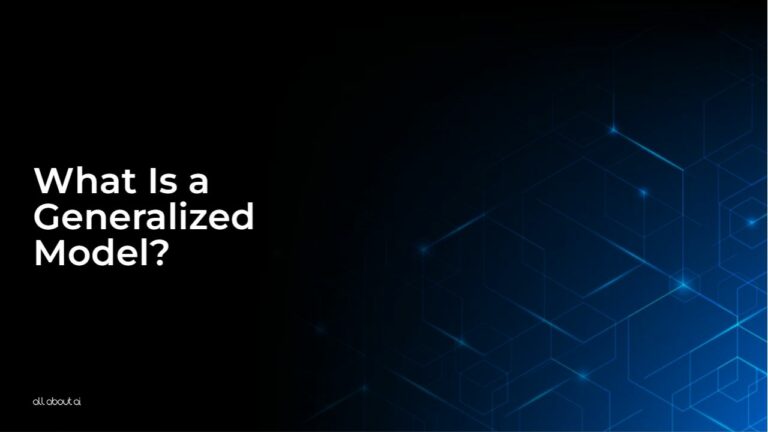What is a Generalized Model? In the realm of artificial intelligence, a Generalized Model refers to an algorithm or system designed to perform effectively across a wide range of tasks or datasets, rather than being specialized for a single task or a specific type of data. This versatility allows Generalized Models to adapt and apply their learning to new, unseen scenarios, making them fundamental in developing robust and flexible AI solutions.
Looking to learn more about Generalized Models and their use in AI? Read this article written by the AI experts at All About AI.
Examples of Generalized Models
Automated Translation Systems: These systems exemplify Generalized Models in AI, translating text or speech between multiple languages. They learn linguistic nuances from vast datasets, enabling them to provide accurate translations even in less common language pairs.
Predictive Maintenance in Manufacturing: AI-driven predictive maintenance systems utilize Generalized Models to forecast equipment failures across various machinery. They analyze diverse data points, such as vibration, temperature, and operational history, to predict maintenance needs before breakdowns occur.
Fraud Detection in Banking: Generalized Models are pivotal in training different algorithms to identify fraudulent transactions across different banking systems. By analyzing transaction patterns and customer behavior, these models can flag unusual activities, adapting to new fraud techniques.
Content Recommendation Engines: Streaming services use Generalized Models to recommend content. By understanding user preferences and viewing history, these models suggest movies, shows, or music from a vast library, tailoring recommendations to each user’s taste.
Use Cases of Generalized Models
Healthcare Diagnostics: AI in healthcare employs Generalized Models to diagnose diseases from various medical imaging types, like MRIs, CT scans, and X-rays. These models assist in identifying anomalies and patterns indicative of different health conditions.
Retail Customer Analytics: In retail, Generalized Models analyze customer data to predict purchasing behavior, optimize inventory management, and personalize marketing strategies, enhancing the customer experience and business efficiency.
Smart City Management: These models are used in smart city initiatives to optimize traffic flow, energy consumption, and public safety by analyzing diverse data from sensors, cameras, and citizen feedback.
Agricultural Yield Prediction: AI models predict crop yields by analyzing data from multiple sources, including satellite imagery, weather patterns, and soil conditions, aiding farmers in planning and resource management.
Pros and Cons
Pros
- Generalized Models are versatile, capable of performing across different tasks and adapting to new scenarios, enhancing AI’s applicability in various fields.
- These models reduce the need for extensive retraining or specialization, offering cost-effective solutions for businesses and organizations.
- By handling diverse data sets, Generalized Models can offer more comprehensive insights and predictions, improving decision-making processes.
- Generalized Models contribute to advancements in artificial intelligence by pushing the boundaries of what machines can learn and how they can apply this learning.
Cons
- Achieving a true generalized capability can be complex and resource-intensive, requiring vast amounts of diverse data and processing power.
- These models might sacrifice some level of specificity and accuracy compared to specialized models tailored for specific tasks.
- The development and maintenance of Generalized Models can be more challenging, requiring expert knowledge and continuous updates.
- There’s a risk of overgeneralization, where the model might not perform optimally in highly specialized or niche scenarios.
FAQs
What distinguishes a Generalized Model from a specialized AI model?
A Generalized Model is designed to perform well across a broad range of tasks and datasets, unlike specialized AI models, which are fine-tuned for specific tasks or types of data. This versatility allows Generalized Models to adapt to new and varied scenarios.
How do Generalized Models contribute to the field of AI?
Generalized Models contribute significantly to AI by offering flexible and adaptable solutions that can be applied across various domains. They drive innovation by pushing the limits of machine learning and expanding the range of problems AI can tackle.
In what sectors are Generalized Models most commonly used?
Generalized Models find extensive use in sectors like healthcare, finance, retail, manufacturing, and smart city management, among others. Their adaptability and versatility make them valuable in diverse fields for various applications.
What are the main challenges in developing Generalized Models in AI?
The main challenges include acquiring and processing vast and diverse datasets, ensuring the model’s adaptability without losing specificity, and continuously updating the model to handle new and evolving scenarios effectively.
Key Takeaways
- A Generalized Model in AI is designed to perform effectively across a wide range of tasks and data types.
- These models are integral in developing versatile and robust AI solutions for various industries.
- Generalized Models are used in applications like automated translation, predictive maintenance, fraud detection, and content recommendations.
- Pros include versatility and cost-effectiveness, while cons involve complexity and potential overgeneralization issues.
- Generalized Models play a crucial role in advancing the field of AI by enabling machines to tackle a broader spectrum of tasks.
Conclusion
Generalized Models epitomize the adaptability and breadth that are hallmarks of advanced artificial intelligence. These models are not just theoretical constructs but practical tools that drive innovation and efficiency across a spectrum of industries, from healthcare to retail, and from finance to smart city management.
This article covered the topic, “what is a generalized model in AI.” Are you looking to expand your AI knowledge horizon? Explore a wide array of AI-related concepts and key terminologies in our extensive AI Lexicon.





